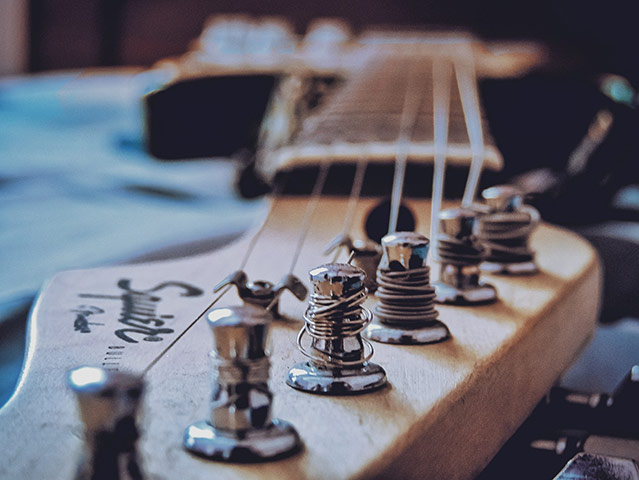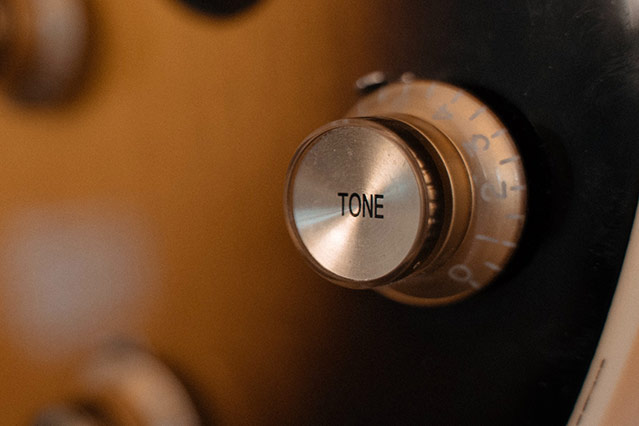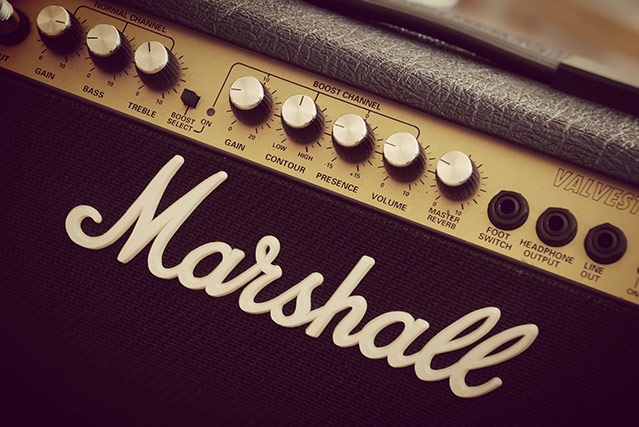One of the most dreadful feelings for a guitarist is when their guitar starts to sound off. Imagine buying a new guitar or a set of new strings to find out it doesn’t sound how you desired. There are many reasons why a guitar might start to sound bad or just off, but today we’ll discuss a particular case when the guitar sounds tinny or too metallic. The sound can also be described as overly bright or treble–forward. Most people dislike this sound because it feels too hollow and shrieky.
First, let me assure you that you’re not alone and that a lot of people face this issue. Did you change your strings? That might be the cause.
Did you buy a new guitar? Sadly, the pickups or a suboptimal setup might be the cause.
Are you trying to record a song on your computer? Your audio interface, or the lack of it, might be causing the issue.
There are many reasons why your guitar might sound tinny, and we’ll be discussing each of them in detail so that you can troubleshoot the problem and hopefully solve it without needing to go to the repair shop. Read on!
See our guide on the topic if you want to make your electric guitar sound metallic intentionally.
7 Reasons Why Your Guitar Might Sound Tinny
New Set of Strings

Most new strings are known to sound too bright, almost tinny when you first put them on. New strings need some wearing–off to sound their best, so you’ll have to bear with the tinny sound for a while. We know that strings degrade slowly and that changing to a new set is part of a guitarist’s journey. The thing with the slow degradation is that the sound also degrades and becomes dull. Sometimes people slowly get used to the dullness and putting on a new set of strings changes the tone drastically.
If you didn’t accidentally buy strings that are supposed to sound brighter, you should be fine after playing them for a few days, in most cases. After which, the strings should sound more natural with a better frequency distribution.
The type of string winding will also make a difference. For example, round–wound strings are known to be generally brighter than flat–wound or half–wound strings which typically sound mellower. Also, very cheap strings can sound bad and tinny. Not all cheap strings sound terrible, but the chances are higher.
In most cases, your new guitar strings would sound much better after playing for a while as the strings gradually “break in” and lose their overly bright, tinny tone. Don’t worry, and keep playing!
New Guitar
Buying a new guitar is a thing to rejoice about, but an off–sounding one is a downer.
New guitars might sound tinny for a couple of reasons. First, because of the reason mentioned above. New guitars have new strings. If someone you know has the same model but which has a different sound, you can rest assured that yours will sound better and mellower as you keep playing it for a while.
The other common reason could be that you bought a guitar that came with a lousy setup out–of–the–box which is common if you bought it online. See the next point for more detail.
Another less common issue could be a subpar pickup, largely found in cheap guitars.
Pickups are the heart of any electric guitar, and poor–quality pickups can make even the best guitars sound very bad. You have a few options if you suspect the pickups are the culprit. You can either get the pickups changed or buy a new guitar.
If you choose to install a new set of pickups, tell the problem to the luthier or repair person and have them give you a quick demo of how you can expect the guitar to sound with the new pickups installed.
If you do not wish to invest more in something you think you bought by poor judgment and would instead buy a new guitar, be sure to test it in the store before putting your hard–earned money into it.
Low Action
Did you change the action of your guitar recently? This might be the reason for the tinny or metallic sound. It is typical for the guitar’s action to change over time. It is the reason why people do a “neck reset” every once in a while to make the action optimum for their playing style.
Sometimes this can result in overcorrection, leaving you with an action which is too low, and the strings start touching the frets causing a tinny buzzing sound. Or it could be that you bought a new guitar, and it came with a suboptimal setup.
Occasionally, only a certain length of the fretboard is affected, but the tinny sound can also come from the entire length of the fretboard, whichever fret you play. When heard closely, one noticeable hint of action causing the tinny sound is the buzzing, humming, or hissing sound. If this is the case, you should adjust your guitar’s truss rod to modify the action. You might also need action adjustment from the bridge side if it’s too off.
Guitar Tone Knobs

Most electric guitars have 1 or 2 tone knobs apart from the volume knob(s). Although different guitars work slightly differently, tone knobs generally let you emphasize the guitar’s mid–or high–frequency range and subsequently cut off the lows. For example, a passive guitar with its tone knob set to full will let most of the high and mid–range frequencies pass through simultaneously, preventing some of the bass frequencies from passing.
Most people would start by adjusting these knobs before doing anything if they feel their guitar doesn’t produce the desired sound. To do this:
- Start by turning the tone knob or knobs all the way back (anti–clockwise), play the guitar, and assess the sound.
- It should sound dark and muddy, then start going up and listen closely if the underlying tinny sound still exists when the tone knobs are still very low.
- If they do, something else might be the issue. If not, continue the fine–tuning until you get the original tone back without the tinniness.
Effect Pedals or Amp EQ Settings

Effect pedals allow you to modify the sound of your guitar. Common effects include distortion, overdrive, wah–wah, chorus, flangers, etc. EQ changes the way your guitar sounds by adjusting the magnitude or intensity of specific frequency ranges giving you an easy way to increase or decrease the bass or treble frequencies for which they are commonly used.
If used incorrectly, anything that alters the sound signal may also mess up the sound output. If you’re using a lot of effects pedals, it would be efficient to disconnect (or turn off) everything and assess the guitar’s sound directly.
If you feel that the guitar by itself sounds fine, start by turning on one pedal at a time. Once you have found out the pedal (or pedals) which is the cause, troubleshoot it further by turning all its knobs (except the Volume, of course) to their lowest and start going up a little at a time. With further adjustments, you can fix the issue quite easily.
If you suspect the issue is with the EQ settings on the amp, you’ll have to do the same thing by turning all the knobs (except Volume and maybe Bass) to the lowest and starting from there. Every amp is different, and some have more EQ settings than others. Typically the Treble and Presence knobs may cause a tinny, metallic sound.
Recording on a PC
This is easy to spot — your guitar sounds fine when connected to an amp, but when you start recording on your computer, it starts to sound tinny.
It is because guitars aren’t meant to be directly connected to a computer for recording without an audio interface. If you’re using a jack adapter (like 1/4th inch to 1/8th inch) to plug your guitar into the mic or line–in port of your computer, you’re going to get a bad sound.
You’ll have to get an audio interface for an optimal experience recording on your PC. These small and versatile devices let you connect your guitar to devices like a computer (PC/Mac) and mobile devices (iOS/Android). Audio interfaces are one of the best investments you’ll make if you want to record your guitar. They’ll make your guitar sound so much better.
Suppose you are still getting the tinny sound despite using an audio interface. In that case, you should look into the settings in both the hardware device (the audio interface) and the software (Digital Audio Workstation or DAW). Many DAWs have a lot of settings, much more than you can imagine or typically would need. See if there are settings that you accidentally changed. Or reset to default and start again with only what you need.
Something Else
While guitars can take a fair bit of abuse, they are actually delicate instruments, and a slight change, such as the degradation of the strings or misadjustment of the truss rod, can significantly impact the sound. Unlike strings and truss rods which are meant for user adjustment, there are a lot of other parts that can make your guitar sound bad but aren’t user–serviceable.
If you’ve checked each point mentioned in this article and can still not resolve the issue, take your guitar to a luthier or service person. Trying to repair a guitar without proper tools, knowledge, and experience could exacerbate the problem or even ruin the guitar. Rest assured, a service person, in most cases, would be able to fix the problem so that you start to play your guitar with its original sound.
Closing Thoughts
It is such a bummer when your guitar starts to sound too metallic in a bad way. You begin to wonder: why does my guitar sound tinny? It is necessary to avoid panic if and when your guitar starts acting up. It is an instrument you play and take with you to places, not something you keep safely just for display. Naturally, it would sometimes have issues. If your guitar hasn’t taken any significant damage from a bump or a fall, it might be a fixable problem. In any case, we hope that this article helped you, and we wish you well in your musical adventures!


